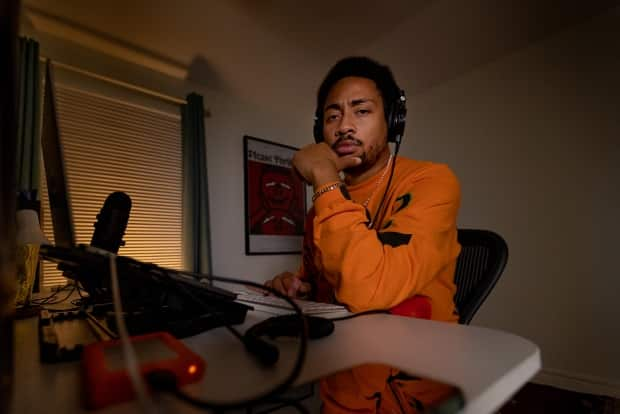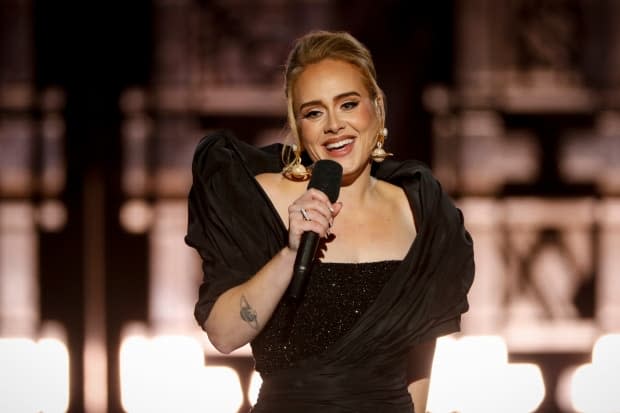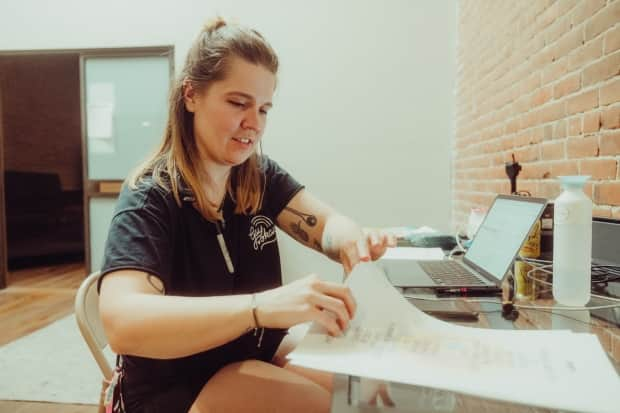Can musicians keep their shows on the road? Heavy costs make touring unrealistic for many acts

Cadence Weapon says touring has always been a risky financial choice for musicians: a gamble between breaking even or losing a little bit of money.
But times have changed. "It's not even worth it for your average artist to get on the road anymore," the Edmonton-born rapper told CBC News.
Weapon won Canada's prestigious Polaris Music Prize in 2021 and went on tour shortly after winning the award. He kept it "bare bones," self-managing the shows; driving the van himself; skipping the lighting crew. After all was said and done, he says he spent $20,000 to lose $2,000.
Concert tours, once a key ingredient in the livelihood of musicians — be they mega popstars, indie favourites or up-and-comers — have become increasingly impractical for many musicians.
We're risking our lives every night when we go on tour, and we know that. - Cadence Weapon
Feeling the squeeze of inflation, the effects of the pandemic and an ongoing fear of illness, many artists have scaled back or cancelled live shows entirely. And that's just those who opted to tour in the first place.
Even as public health circumstances and the cost of living have changed dramatically, audience behaviour and venue safety standards have stayed the same, Weapon said.
"We're risking our lives every night when we go on tour, and we know that."
WATCH | Pandemic hurdles, inflation mean tours may be on hold:
Bigger artists cushioned by residencies, fandoms
After two years without the option of live performances, some of the music industry's biggest names are plunging headfirst back into the scene.
But the gruelling tour lifestyle takes its toll: Canadian pop stars like Justin Bieber and Shawn Mendes both suspended their tours this year, citing physical and mental health concerns.
Instead of incurring the mental strains and financial expenses that come with multi-leg international tours, other major acts are settling into residencies where their audiences come to them.

Adele, who released her album 30 in 2021 after a six-year hiatus, will soon begin a residency in Las Vegas, and Katy Perry will follow with her own Vegas residency in December. K-pop superstars BTS also completed a brief Las Vegas residency in February.
Harry Styles, whose album Harry's House dropped during a year when he also starred in two movies, launched a residency tour this summer that will see him perform several shows in a limited number of North American cities, including Toronto.
Then there are the juggernauts: Taylor Swift added 17 more stops to her upcoming tour on Friday, including five shows in Los Angeles, making it her biggest U.S. tour ever.
She's released four new albums and re-recorded two earlier albums since her last tour in 2018 — and those songs haven't been performed live at this scale before.

Audiences hungry for shows, but touring pantry is bare
Fans are hungry to see their favourite performers, to put it lightly.
Live Nation, the California-based event promotion company, announced that this summer's concert season brought its highest quarterly attendance rate ever, and that its ticketing company Ticketmaster also saw an increase in sales.
But the rush to get back onstage means that many artists are seeking the same production equipment all at once, leading to shortages and higher costs.
"Suddenly everyone wants to do the same thing at the same time," said Jen Ochej, a tour manager who has worked with Canadian musical acts like Lights, Jessie Reyez and The Dears.

Artists big and small are looking for technical crew that dried up during the pandemic when live shows ground to a halt and workers fled the industry.
With so much current demand, venues are booked solid, gear is quickly rented out and tour buses are already reserved. Meanwhile, gas prices are exorbitant, nevermind plane tickets.
"Things are being done on shoestring budgets or costing far more than they ever did before, which puts a lot of stress on the people managing the money and the people whose money it is," Ochej said.
Santigold, Animal Collective and Little Simz have all cancelled their tours this year for various reasons, but all cited financial distress as a significant factor in their decision.
Major artists are struggling with similar problems, albeit on a different scale. They have the safety net of devoted fanbases, which cushions them from the crash that many smaller musical acts are facing right now.
Audiences can't rationalize spending money on smaller acts when they've shelled out to see a superstar, especially those travelling to a different city to watch a residency show.
"Those same people are probably not going out that same week to see a smaller artist play," said Ochej. "They're going to Harry Styles and then going home."
'A sitting duck playing Russian roulette'
Loreena McKennitt, a Celtic singer-songwriter based in Stratford, Ont., cancelled a European tour in early 2023 because it wasn't financially feasible.
But there's also the looming spectre of illness. Earlier in the fall, she had no choice but to scrap a handful of shows when one of her touring musicians fell ill with COVID-19.

"If I'm putting up half a million dollars before I step on a stage at the beginning of the tour and I get struck by COVID for a week or two, then I'm hugely out of pocket a lot of money. So it would be a financial hit that I just simply wouldn't be able to survive," McKennitt told CBC News.
At this stage of the pandemic, where masks are optional in indoor spaces, she said performing makes her feel like "a sitting duck playing Russian roulette."
Her fears aren't unfounded. Drake, Ringo Starr and Avril Lavigne have all cancelled shows recently after contracting COVID-19.
Without the option to tour and perform in front of a live audience, "you're not really fulfilling your mission and why you've chosen to be an artist in the first place," McKennitt said.
Montreal venue Turbo Haus is trying to ease some of the financial pain felt by small musical acts. The 150-person capacity bar is emulating a European music venue model, offering free meals and on-site accommodations to touring bands, according to co-owner Sergio da Silva.
"Venues and bands are pretty much linked at the hip," he said. "We're inseparably connected in terms of how things run. So if a band is suffering, venues are suffering."
Canadian tours are even more challenging for artists on the road, da Silva said, because the country's major cities are so geographically distant. That's a lot of gas compared to the U.S., where da Silva notes that Boston, New York, Philadelphia, Baltimore and Providence are all within a few hours of each other.

Touring future uncertain for smaller artists
Despite these efforts to make things easier for performers, it's still uncertain what will become of smaller artists who want to share their music with a live audience, but are faced with impossible circumstances.
"It's one thing if you have established yourself for a few years already," said Ochej, because you might already have a small but familiar fan base.
"But for these up-and-coming artists who … haven't yet built up that live audience, I really wonder how that goes for them, and I don't know."
LISTEN | Cadence Weapon on the future of touring:
Weapon says seeing live concerts in his youth is the reason he became an artist.
"I got to go to live music shows and see musicians who really inspired me and really showed me a world outside of what I had seen growing up as a kid in Edmonton, and it's like, I feel like that opportunity is going away," he said.
But he's still optimistic about the future.
"I believe there is enough hunger for reform in the music industry. And I feel like there's a lot of people speaking out about this and I feel like things can change."


